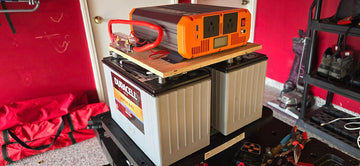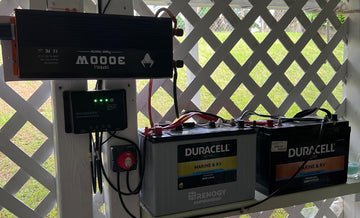Golf carts have become a popular choice for personal and recreational transportation, valued for their environmental friendliness and ease of use. However, one question that golf cart owners often ask is whether they should leave their golf cart plugged in all the time. It's wise to keep an eye on the health of your golf cart's battery, because if you don't take care of it as you should, repairing or replacing your cart's battery could cost you a lot of money.
This blog post explores the pros and cons of keeping your electric golf cart plugged in and provides insight into battery maintenance, potential risks and best practices for extending the life of your golf cart battery!
Learn about golf cart battery
Electric golf carts are typically powered by lead-acid or lithium-ion batteries. Proper maintenance of these batteries is essential to ensure optimum performance and longevity. Here are some key points for both types of batteries:
Lead acid batteries: Traditional golf cart batteries are usually lead acid. They are relatively cheap but heavy and require regular maintenance, including watering and charging.
Lithium-ion batteries: Compared to lead-acid batteries, lithium-ion batteries are becoming increasingly popular due to their longer life, high endurance and lower maintenance requirements.
The case for leaving your golf cart plugged in
Some people advocate ‘keeping the golf cart plugged in’ for several reasons:
Preventing battery discharge
Even when not in use, batteries discharge slowly. This is known as 'standby loss' and varies depending on the type of battery and storage conditions. For example, a conventional lead-acid battery will lose 10-15% of its charge each month if left unused.
On the other hand, regularly discharging a battery until it is completely flat can also shorten its life. This is because deep discharge cycles put a lot of stress on the battery and can lead to what is known as 'capacity degradation'.
Readiness
Keeping your golf cart plugged in ensures that it is always fully charged and ready for use. If you only charge your battery when you need to use your golf cart, there is a risk that the battery will not be fully charged when you need it.
Often, especially during the winter months, golf carts are not used for months at a time. As a result, if left uncharged for a long period of time, the battery cells will slowly deteriorate, which can adversely affect the overall performance of the battery.
Battery condition maintenance
Modern electric golf carts are equipped with advanced chargers designed to prevent overcharging. Once the battery is fully charged, these chargers automatically switch to maintenance or trickle charge mode, helping to keep the battery in good condition.

Reasons to avoid plugging your golf cart in
As golf cart owners, it's easy to be tempted to keep our cars plugged in and ready to go. However, there are some drawbacks to this practice. Keeping your golf cart's battery plugged in for extended periods of time can have detrimental effects.
Firstly, it's bad for your battery. Frequent full charges accelerate battery deterioration, leading to more frequent replacements. When a battery is constantly fully charged, it undergoes 'battery polarisation', which leads to cell degradation and ultimately a reduction in overall capacity.
In addition, continuous charging often causes a circuit breaker to trip, indicating a malfunction in the battery's automatic cut-off function. This forces the charger to continue supplying power to the battery, leading to overcharging and performance degradation.
Staying plugged in can also affect the charger itself, reducing its efficiency over time and lengthening the charging process. Chargers that start up are also at risk of failure, which can lead to battery damage or even fire.
If prolonged plugging in is unavoidable, it is advisable to periodically unplug the trolley to give the battery a rest.
Best practices for golf cart battery maintenance
To ensure the longevity and performance of your electric golf cart battery, follow these best practices:
Battery storage during the off-season
If you plan to store your golf cart for an extended period of time, such as during the winter months, it is important to consider how this will affect the battery. Many golf cart owners mistakenly believe that they should leave their carts plugged in to prevent battery discharge. However, even with a charger plugged in, there is a risk of overcharging and damaging the battery if the charger is not cycling properly.
Instead, if you're going to store your trolley for a few months, it's a good idea to fully charge the battery, unplug the charger and disconnect the battery cables. Check the battery level regularly during the off-season and recharge if it falls below a certain threshold (usually around 50 per cent). This method prevents the battery from being completely discharged without being exposed to constant current, which could cause damage.
Also check the battery and charger regularly for signs of damage or wear. Check that the battery terminals are clean and free of corrosion.
Temperature and charging
The environment in which a golf cart is stored and charged can greatly affect battery performance. Extreme temperatures (either high or low) can accelerate the degradation of battery cells. If a golf cart is charged in a very hot environment, the battery is more likely to overheat. On the other hand, low temperatures reduce the battery's ability to hold a charge effectively, thus reducing battery efficiency. Optimum storage temperatures are generally between 10°C and 25°C.
It is important to store your golf cart in a climate-controlled area, or at least to avoid prolonged exposure to extreme temperatures. This will not only protect the battery, but will also ensure that the charger works properly and efficiently.
Using a smart charger
If you're worried about leaving your golf cart plugged in for long periods of time, but still want to make sure the battery stays charged, consider buying a smart charger. Smart chargers are designed to monitor the battery's charge level and stop charging when the battery is fully charged. They also have a 'float' charge function, which means they stay fully charged without overcharging the battery.
Smart chargers are perfect for those who use their golf carts infrequently or store them for long periods of time. With a smart charger, you can plug in your golf cart without worrying about overcharging or damaging the battery.
Best choice for golf carts - LiFePO4 Lithium Batteries
As mentioned above, one of the main reasons for using batteries is the self-discharge rate. Lead-acid batteries have an average self-discharge rate of 10-15% per month. Fortunately, a new technology type of battery is now popular on the market, namely lithium batteries.
Lithium batteries are popular because they have a lower self-discharge rate than traditional lead-acid batteries. On average, lithium batteries have a self-discharge rate of only about 1-3% per month, which is much lower than lead-acid batteries.
This means that lithium batteries can hold their charge longer without frequent recharging, making them an attractive option for golf cart owners. Here is a comparison of the self-discharge rates of lead-acid and lithium batteries so that we can easily see how stable lithium batteries are.

In addition to a lower self-discharge rate, lithium batteries offer other benefits such as longer life, lighter weight and faster recharge times. While lithium batteries have a higher initial cost than lead-acid batteries, their overall cost effectiveness in the long run, coupled with their superior performance, makes them a great choice for those looking to upgrade their golf cart battery system.
What are the benefits of a lithium golf cart battery charger?
Using a lithium golf cart battery charger (also known as a smart charger) offers several advantages in maintaining and extending the life of lithium batteries. These chargers are specifically designed to meet the unique charging requirements of lithium batteries, ensuring optimum performance and longevity. Related reading: Can I use a lead-acid charger to charge lithium batteries?
One of the main benefits of using a lithium golf cart battery charger is the precise and controlled charging it provides. Smart chargers use advanced charging algorithms and sophisticated monitoring systems to deliver the right amount of charge to the battery, avoiding overcharging and undercharging, both of which can have a serious impact on the overall health and life of the battery.
In addition, Li-ion battery chargers are often equipped with temperature monitoring and voltage regulation features to further ensure the safe and efficient charging of Li-ion batteries. These features help to protect the battery from potential damage caused by extreme temperature and voltage fluctuations, and ensure that charging is carried out in a way that maximises battery life and performance.
The intelligent Li-ion battery charger features an energy-efficient design that reduces energy consumption during the charging process. This not only helps reduce environmental impact, but also contributes to long-term cost savings.
Thanks to the Smart Charger's built-in protection, it is possible to leave the charger connected overnight, but it is recommended to unplug the charger when the battery is fully charged and stored properly, even when not in use.

















